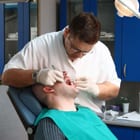 Dental pain, ranging from continuous dull throbbing to sharp intense stabbing sensations, is notoriously unpleasant. The reason why dental pain stands out from other types of pain is that it usually stems from the dental nerve which can be very exposed if the tooth is affected by decay.
Dental pain, ranging from continuous dull throbbing to sharp intense stabbing sensations, is notoriously unpleasant. The reason why dental pain stands out from other types of pain is that it usually stems from the dental nerve which can be very exposed if the tooth is affected by decay.
Dental pain is commonly known as toothache which can be misleading because in reality all parts of the teeth, nerve structure and soft tissue can cause painful sensations. At the lower end of the scale is pain caused by sensitive teeth. This is when enamel has thinned or eroded leaving the dentine and tooth root slightly more exposed to extremes of hot and cold from food, and even simply breathing in. The extreme of temperature sends a stimulus to the nerve that passes through the dentine that causes the pain. Sensitive teeth can be treated in several different ways that include using more effective toothpastes and cleaning methods but in more serious cases teeth may need a filling or crown to provide an extra layer of protection against pain.
More serious dull or sharp pain can be caused by infection of the tooth or gum. When a dental cavity exposes the sensitive central part of the tooth it can sometimes become infected with the bacterial matter that lives in the mouth. This bacterial infection attacks the root of the tooth containing the dental nerve, which can be extremely painful. This can also lead to painful dental abscesses as the body attempts to fight back by producing more white blood cells. This builds up in pockets around the teeth causing very nasty and painful abscesses.
Most dental pain will respond to over-the-counter treatment with painkillers but in all cases it is important that you make an appointment to see a Leeds dentist as soon as possible, even if the pain appear to have disappeared naturally. This could be the result of an infection destroying a nerve causing a temporary end to the pain but the infection may still spread to other parts of the mouth.





 There are few if any dental problems that cannot be treated successfully if diagnosed early enough. Ideally, any pain or discomfort experienced in the mouth should be seen by a dentist as soon as possible. With dental care it is prevention that is much more effective than cure. This is why dentists stress the importance of six-monthly check ups.
There are few if any dental problems that cannot be treated successfully if diagnosed early enough. Ideally, any pain or discomfort experienced in the mouth should be seen by a dentist as soon as possible. With dental care it is prevention that is much more effective than cure. This is why dentists stress the importance of six-monthly check ups. What is a dental implant and how can I benefit from one? That is a question that a dentist in Leeds is asked a lot. He explains it as an artificial tooth that has all the qualities of a natural one, but with some vast improvements that are unique to the patient. The sort of teeth he usually replaces with implants are either damaged beyond repair, discoloured or misshapen teeth. It is ideal for a patient who requires an individual or a few separate teeth replaced. The procedure is quite simple too; first X-rays are taken to ascertain the strength of the jaw bone below or above the rogue tooth. Then a tooth is made to fit perfectly into the gap left by the removal of the damaged tooth. A drilled hole is made in the jaw and a base is placed in the hole. This has a pre-prepared screwed insert running up the centre, into this is screwed and glued the new tooth, how easy is that? It not only provides the patient with better eating habits, it has a tendency to also give them back some confidence they might have lost through the rogue tooth. An improved and confident smile is one of the first benefits; it also alleviates the need to replace a whole row of teeth for the sake of a few bad ones. False teeth are O.K. in most cases and patients adapt to them really well, but implants are the definitive answer in a lot of cases that in the past would have resulted in more expensive, and long term treatment. Chewing has also been reported by patients to have been drastically improved in many cases, and that in itself is a healthy improvement against decay and gum disease.
What is a dental implant and how can I benefit from one? That is a question that a dentist in Leeds is asked a lot. He explains it as an artificial tooth that has all the qualities of a natural one, but with some vast improvements that are unique to the patient. The sort of teeth he usually replaces with implants are either damaged beyond repair, discoloured or misshapen teeth. It is ideal for a patient who requires an individual or a few separate teeth replaced. The procedure is quite simple too; first X-rays are taken to ascertain the strength of the jaw bone below or above the rogue tooth. Then a tooth is made to fit perfectly into the gap left by the removal of the damaged tooth. A drilled hole is made in the jaw and a base is placed in the hole. This has a pre-prepared screwed insert running up the centre, into this is screwed and glued the new tooth, how easy is that? It not only provides the patient with better eating habits, it has a tendency to also give them back some confidence they might have lost through the rogue tooth. An improved and confident smile is one of the first benefits; it also alleviates the need to replace a whole row of teeth for the sake of a few bad ones. False teeth are O.K. in most cases and patients adapt to them really well, but implants are the definitive answer in a lot of cases that in the past would have resulted in more expensive, and long term treatment. Chewing has also been reported by patients to have been drastically improved in many cases, and that in itself is a healthy improvement against decay and gum disease. Look after your teeth and they will last a lifetime. So the saying goes, and there really is a lot of truth in it. Caring for your teeth involves making only small sacrifices but just these few preventative measures could prevent years of misery caused by dental decay and other associated dental problems. Having problems with your teeth is no laughing matter as anyone who has had a root canal procedure will tell you but can easily be avoided by following a few simple rules.
Look after your teeth and they will last a lifetime. So the saying goes, and there really is a lot of truth in it. Caring for your teeth involves making only small sacrifices but just these few preventative measures could prevent years of misery caused by dental decay and other associated dental problems. Having problems with your teeth is no laughing matter as anyone who has had a root canal procedure will tell you but can easily be avoided by following a few simple rules. In the fight against dental decay there are several key defences. The most important is regular and correct brushing and flossing of teeth. Brushing and flossing help to fight plaque, a filmy substance made up of bacteria and other debris, that covers the teeth and attacks the enamel. If plaque is not removed by brushing it will break down enamel causing tooth decay. This can lead to painful toothaches and abscesses that can lead to tooth loss. Flossing is particularly important for removing plaque and food debris from between teeth that causes tooth decay and is also responsible for 90 per cent of cases of bad breath. If allowed to remain plaque will also transform into tartar, a hard yellow/brown substance that also destroys enamel but that is impossible to remove by conventional cleaning.
In the fight against dental decay there are several key defences. The most important is regular and correct brushing and flossing of teeth. Brushing and flossing help to fight plaque, a filmy substance made up of bacteria and other debris, that covers the teeth and attacks the enamel. If plaque is not removed by brushing it will break down enamel causing tooth decay. This can lead to painful toothaches and abscesses that can lead to tooth loss. Flossing is particularly important for removing plaque and food debris from between teeth that causes tooth decay and is also responsible for 90 per cent of cases of bad breath. If allowed to remain plaque will also transform into tartar, a hard yellow/brown substance that also destroys enamel but that is impossible to remove by conventional cleaning.

